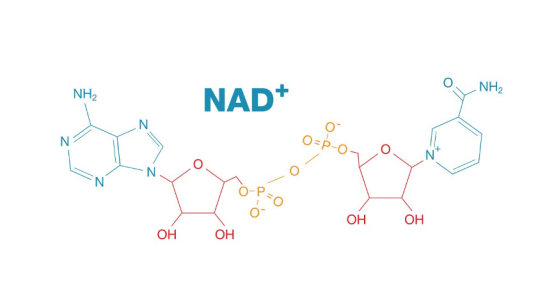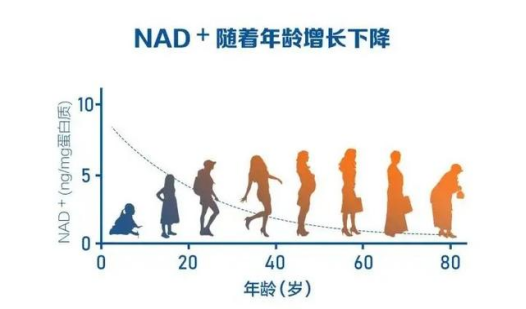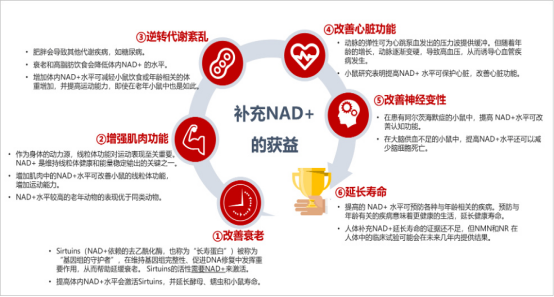
1. What is NAD+
NAD is a proper biological term, its Chinese name is nicotinamide adenine dinucleotide, abbreviated as coenzyme I. It is a kind of electron transfer. It is a coenzyme of many dehydrogenases in the body. It connects the tricarboxylic acid cycle and the respiratory chain. Its function is to transfer the hydrogen taken off during metabolism to flavoprotein. NAD+ is its reduced form.
NAD+ plays an irreplaceable role in glycolysis, gluconeogenesis, tricarboxylic acid cycle and respiratory chain. The intermediate product will transfer the removed hydrogen to NAD, turning it into NADH. NADH, as a carrier of hydrogen, synthesizes ATP through chemical osmotic coupling in the respiratory chain and participates in the energy supply of all life activities in the body.
2. The four major effects of NAD+ on aging
01NAD+ can activate human longevity factors, maintain telomere length and extend lifespan
NAD+ is a nutrient necessary for the function of histone sirtuins (Sirtuins), which scientists call "longevity factors". In particular, it can maintain the length of key telomeres, slow down the aging process and extend lifespan. A total of 7 isoforms from SIRT1 to SIRT7 constitute the Sirtuins protein family, which also constitutes the "longevity factor".
The levels of SIRT1-7 in the human body depend on the level of NAD+. As age increases, as well as external stress and damage, the decrease in NAD+ concentration will lead to insufficient or non-activation of longevity factors;
02 NAD+ promotes gene repair and delays cell aging
NAD+ can improve the ability of DNA to repair itself and extend lifespan by reversing mitochondrial decline, including reducing stress, eliminating inflammatory responses, and protecting against DNA and mitochondrial damage;
03 NAD+ promotes cell regeneration and resists immune system diseases
NAD+ is a coenzyme that promotes cells to generate energy from nutrients. Sufficient NAD+ levels can ensure cell energy supply and promote cell regeneration, which is a crucial factor in delaying the aging of the immune system, resisting infection and producing autoimmune system diseases; 2018 In March 2019, a study published in the internationally renowned magazine "Cell" found that after increasing NAD+, the number and density of capillaries in "old mice" and "young mice" were almost the same, and their endurance Increased by up to 80%, it can be seen that NAD+ can delay aging;
04 NAD+ improves chromosome stability and reduces the risk of various diseases and cancers
NAD+ can improve chromosome stability, thereby slowing down cell aging, reducing the risk of various diseases, and reducing the risk of cancer to a certain extent.
At this stage, there is insufficient clinical data on anti-cancer and anti-tumor effects. This function is still under continuous research. Tumor and cancer patients are not recommended to take it directly.
NAD+ has many functions and is closely related to human aging and longevity. However, the total content of NAD+ will be depleted at a high speed over time, leading to various aging phenomena and aging-related diseases. When you are 30 years old, you will be unable to make ends meet. When we reach the age of 40 to 60, the loss of NAD+ is nearly 50%. At the age of 60, the NAD+ content in the human body is only about 12.5% of the initial level.

Figure 1: The level of NAD+ in the human body shows a downward trend with age.
As NAD+ levels decrease, DNA repair, cellular stress response, and energy metabolism regulation will be impaired, leading to a series of age-related diseases. The specific mechanism may be related to overactivation of PARP*, decreased immune system function, downregulation of SIRT# expression, etc. A series of metabolic disorders are related to inducing diseases, including obesity and insulin resistance, diabetes, hypertension, non-alcoholic fatty liver disease, atherosclerosis, Alzheimer's disease (commonly known as Alzheimer's disease), retinopathy and depression, etc. .
3. How to improve NAD+ levels
As we age, cellular NAD+ levels plummet to near zero. Generally speaking, supplementing NAD+ is the most direct way to supplement. However, NAD+ is biologically unstable, and it has not been proven that any substance can transport NAD+ directly into cells, which makes it unsuitable for oral supplementation.
Scientists have proven through research that NAD+ levels in the body can be increased by supplementing NAD+ precursors.
NMN is the precursor of NAD+ and can be converted into NAD+ in the body. Research shows that the Slc12a8 protein will directly transport NMN into cells with the help of sodium ions and quickly function for the production of NAD+; when When NAD+ levels decrease, cells will also enhance the expression of the Slc12a8 gene, increasing their ability to transport NMN; it is currently the safest and most stable NAD+ supplement.

Figure 2: Benefits of NAD+ supplementation
The future of NAD+
The aging of the world's population brings more time for three or even four generations to gather together, but it is also accompanied by a heavy burden of chronic diseases in the elderly. According to data released by the National Bureau of Statistics, as of the end of 2019, the number of people aged 65 and above in my country reached nearly 180 million, accounting for 12.6% of the total population. According to the United Nations standard (7%), our country has already entered an aging society. Survey data published by researchers from the Chinese Center for Disease Control and Prevention also show that 75.8% of people aged 60 and above in my country are troubled by one or more chronic diseases, and one person suffers from multiple chronic diseases. The phenomenon is serious, and the support of four elderly people The burden brought by the cost of medications for various chronic diseases hangs over many young children of two-person families.
Under the "silver wave", it is urgent to address age-related chronic diseases to reduce health and economic burdens. Now scientists may have found a possible solution: NAD+.
NAD+ is also known as the "miracle molecule" that restores and maintains cell health. In animal studies, it has been proven to have strong potential in treating various diseases such as heart disease, diabetes, Alzheimer's disease and obesity. Scientists' research on NAD+ continues. Confirming the safety and efficacy of NAD+ supplementation in humans may be a key step toward realizing the ideal solution to the disease burden of aging.
Post time: Dec-14-2023


